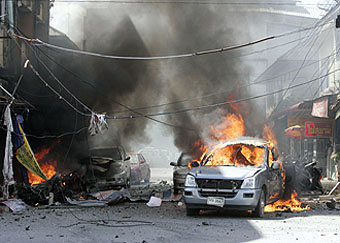Seven car bombs exploded across Baghdad on Thursday, killing at least 13 people in apparently coordinated attacks that targeted mainly Shi'ite Muslim districts, security sources said.
No group immediately claimed responsibility for the bombings. But Sunni Islamist militants have been regaining ground in Iraq, particularly in the western province of Anbar where they overran two cities on January 1, Reuters reported.
Since then, more than 1,000 people have been killed across the country, building on a trend of intensifying violence that made last year Iraq's bloodiest since 2008, when sectarian warfare began to abate from its height.
On Thursday, bombs were detonated in the predominantly Shi'ite neighborhoods of Sadr City, Karrada, Hurriya, Ubaidi and Shaab. Civilians from Iraq's Shi'ite majority are often targeted by Sunni insurgents.
Another explosion killed three people in the commercial Bab al-Sharqie district, near a bridge across the river Tigris leading to the heavily-fortified "Green Zone", home to the prime minister's office and several Western embassies.
In recent days, militants have staged a series of attacks near the Green Zone and outside the Ministry of Foreign Affairs, heightening concerns about Iraq's ability to protect strategic sites as security deteriorates.
The city of Falluja is currently surrounded and under shelling from the Iraqi army in preparation for a possible ground assault to end a month-long standoff with Sunni anti-government fighters inside the Anbar city.
The militants include members of the Islamic State in Iraq and the Levant (ISIL) - a Sunni group also active in neighboring Syria's civil war.
"We believe that storming Falluja as soon as possible is much better than the current situation," a senior security official told Reuters on condition of anonymity. "Yes, there will be many casualties, but it's better than this strain on army resources."
The official said a ground assault would not be launched until security forces finished battling militants in two small towns that are important entry points to Falluja. Communications have also been cut.
"The militants have booby-trapped roads, homes, animals and even dead bodies inside Falluja, so we have to keep the communications down as they use mobile signal to blow up these traps," the official said.
Maliki has appealed for international support and weapons to fight al Qaeda. But critics say his own policies towards Iraq's once-dominant Sunni community are at least partly to blame for reviving an insurgency that had peaked in 2006-07.
Some tribes in Sunni-dominated Anbar support or have aligned themselves with ISIL against Maliki's Shi'ite-led government, which they accuse of abuses against their sect.
Others deplore ISIL's violent tactics and have joined forces with the army to fight the group and its allies in and around Anbar's city of Ramadi, also overrun by militants last month but now largely back under government control.
The United Nations said it had delivered aid including tents, medicine, water and food parcels to some of the 45,000 families that have been displaced by the conflict in Anbar.
"The U.N. continues to hold discussions with senior political figures in an attempt to assist in paving the ground for a political solution to the crisis, calling on all to show national unity and address the root causes of violence in Iraq," U.N. envoy Nikolay Mladenov said in a statement.






